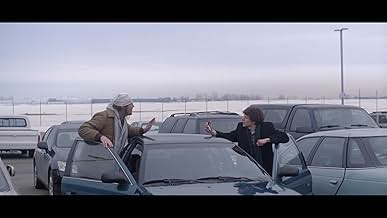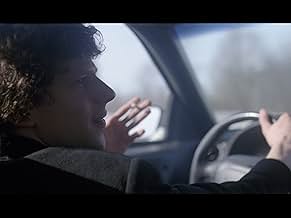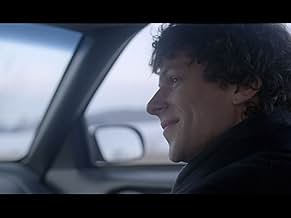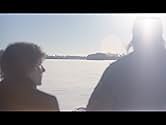The story of the five-day interview between Rolling Stone reporter David Lipsky and acclaimed novelist David Foster Wallace, which took place right after the 1996 publication of Wallace's gr... Read allThe story of the five-day interview between Rolling Stone reporter David Lipsky and acclaimed novelist David Foster Wallace, which took place right after the 1996 publication of Wallace's groundbreaking epic novel, 'Infinite Jest.'The story of the five-day interview between Rolling Stone reporter David Lipsky and acclaimed novelist David Foster Wallace, which took place right after the 1996 publication of Wallace's groundbreaking epic novel, 'Infinite Jest.'
- Director
- Writers
- Stars
- Awards
- 4 wins & 18 nominations total
- Bookstore Patron 2
- (as Jennifer Holman)
- Student 5
- (as Javon Anderson)
- Director
- Writers
- All cast & crew
- Production, box office & more at IMDbPro
Featured reviews
Jason Segel and Jesse Eisenberg live up to the task of interpreting the script, helped along the way by director James Ponsoldt. The direction is simple, and the camera work is relatively basic throughout, giving the actors plenty of room to work with natural rhythm. Segel definitely impressed me, as this was the first dramatic role I've seen him in. While he didn't exactly capture some of Wallace's real-life mannerisms, I'm not sure if that was exactly the point of the film. He interpreted the script in a powerful way, and I think that that ended up working out quite well for the overall tone of the film. Eisenberg played his usual somewhat neurotic, slightly asshole- ish character very well, and I thought it fit the reporter role perfectly.
Overall, I would strongly recommend the film. 9/10
The story is about an odd sort of interview that took place when David Lipsky (Eisenberg) of Rolling Stone Magazine hung out with literary star David Foster Wallace (Segal) for several days back in the late 1990s. Cutting right to the chase, the film begins with the announcement that Wallace committed suicide and the film is a flashback as Lipsky remembers the strange and very lengthy meeting the two had back in 1996. As I said, this lasted days as the two just hung out together and talked...making it far different than a typical magazine interview.
As far as what they talk about and the themes of their meeting go, this really isn't something I can really explain very well in a review-- you just need to see it and experience it. Instead, I would rather try to convey the style of their time together on the film. It feels like you are a fly on the wall as two intellectuals talk and talk and talk....and talk. Wallace generally presents more as an 'Every Man' sort of guy while Lipsky seems, at times, as if he's trying to impress his new friend with his intellectual prowess. What all this means...well, that's really up to the viewer.
The bottom line is that if you really like action films, this film's is probably not for you. If you love 'literature' as opposed to just reading a book for enjoyment, this movie might be exactly what you'd love to see. As for me, I think I'm in the middle on this one. I can really respect the acting as well as the filmmakers' desire to make a quality picture as opposed to a mass-marketed film. But, on the other hand, the film is slow and very deliberate. It also took a while until I really stared to appreciated it...and I'm not if I ever exactly enjoyed it.
Jason Segel absolutely owned this film, with an eye opening & career-defining performance far from his usual comfortable roles in comedies. His portrayal of David Foster Wallace was so on point, that the complexities of the character naturally flourishes. Also, his expositions simply captivates. His robust & free flowing delivery leaves us, the audience, in the exact same position as Jesse Eisenberg's character - hanging onto his every detail, with a craving for more.
Apart from Segel's Oscar worthy delivery, the illuminating subject matters were just as mesmerizing. As our leads converse on love, loneliness, fame, career & social trends, the film then connects on a personal level, in more ways than one. It is a kind of film that invites self-reflection & embeds ideas on how to live life.
Overall, The End of the Tour is a film that imparts reverence for the character that is David Foster Wallace, by way of picking through the brains of the great writer. It does so through incredibly true and entertaining intellectual discussions that offers the film's inspiring moments. Brilliantly acted, thought provoking and profoundly moving, this independent film demands deeper appreciation, and I happily oblige.
What little there is of plot is made up for in excellent characterization. The film is really all about existentialism, and thankfully it never leans towards pretentiousness. Rather there is an air of optimism about making your time on earth worthwhile. Wallace and Lipsky in a way represent two extremes of existentialism. Wallace is very relaxed, and takes his newfound celebrity with a grain of salt, while Lipsky is very Type-A, yet never brash or irritating. Lipsky has been trying to get his foot in the door as an author for a while now, while Wallace almost became famous overnight, and the film plays with the concept of "fame" in fun and unique ways. Through the film, Ponsoldt is able to explore these two extremes and find common ground between them, all while touching on the idea of fame and what it means to different people.
The script is outstanding, and hits all the right notes I touched on above. The dialogue between Lipsky and Wallace feels natural, nothing is forced. I wonder how much improvisation was done for the film, because the two seem like good friends from the moment they meet. There is a natural chemistry that draws these two characters together, and it's outstanding to watch on-screen. It's difficult to adapt a book like Lipsky's, which is mostly interviews and recording, as the book was published after Wallace's death in 2008. But screenwriter Donald Marguiles makes it work, and the result is an insightful, often hilarious film.
All this talk about chemistry would be a waste if it weren't for Jason Segel and Jesse Eisenberg as Wallace and Lipsky, respectively. Segel is a marvel as Wallace; it's a performance that doesn't demand much, yet Segel taps into all of Wallace's nuances and quirks. His delivery, cadence, and warmth almost makes it feel like you're talking to an old friend. It's a subtle performance that I hope is remembered come awards season. Eisenberg, too, is great. His reporter-type isn't very developed until the middle-end of the film, and he might come across as annoying for some. But he makes Lipsky tick as the curious interviewer wanting to learn more. He's driven by his desire to success, his want to make a successful piece for Rolling Stone, yet he ends up with a lot more.
The End of the Tour is a huge success. It isn't a very showy film, without much in the way of technical prowess, yet it's a talker. The realistic dialogue and blasé tone make the film feel like a 140 minute hang out with two good friends. Ponsoldt keeps a tight grip on the film's themes, never letting one overpower the film's true intentions. It's a wonderful ode to Wallace, and a funny one at that.
Probably the only unfortunate part of all this is that this movie is not going to have wide appeal. It is almost exclusively about the real life meeting between a Rolling Stone journalist and newly minted super-author David Foster Wallace, back in the 90s. As such it is almost all dialog meant to convey a sense of Mr Wallace's breadth of knowledge about popular culture and his imagination.
There's little drama or action here in the usual sense. Still Mr Segel is most effective in breathing life into the man such that you would love to have known him. Even his co-star, Jesse Eisenberg, who I don't usually warm up to, is quite up to the task at hand, i.e., sparring with the great author to get the real man down on paper.
I loved the film, but I must make special mention that, for a film filled with dialog, for once, I caught every word. There was no asking my wife, what did he say? Why can't every film be as carefully constructed?
Did you know
- TriviaThe song heard on the soundtrack when the film ends is "The Big Ship" by Brian Eno, one of David Foster Wallace's favorite songs. It was also used for the climax of Me and Earl and the Dying Girl (2015), another film that premiered at the 2015 Sundance Film Festival.
- GoofsIn regards to the scene where Mrs. Gunderson gives Mr. Wallace and Mr. Lipsky a car tour of Minneapolis sites: The Mary Tyler Moore statue on Nicollet Mall in Minneapolis, was not given to the City by TV Land until 2002. Also, it is not legal for cars to drive down Nicollet Mall.
- Quotes
David Foster Wallace: It may be in the old days what was known as a spiritual crisis: feeling as though every axiom in your life turned out to be false... and there was actually nothing. And that you were nothing. And that it's all a delusion and you're so much better than everybody 'cause you can see how this is just a delusion, and you're so much worse because you can't fucking function.
- Crazy creditsHalfway through the closing credits, there is an extra scene told from the perspective of David Foster Wallace as Lipsky goes to the bathroom to wash out the chewing tobacco. It shows what Wallace did while he was in the bathroom: he speaks privately into the tape recorder.
- How long is The End of the Tour?Powered by Alexa
Details
Box office
- Gross US & Canada
- $3,002,884
- Opening weekend US & Canada
- $123,238
- Aug 2, 2015
- Gross worldwide
- $3,072,991
- Runtime1 hour 46 minutes
- Color
- Sound mix
- Aspect ratio
- 2.35 : 1
Contribute to this page



































